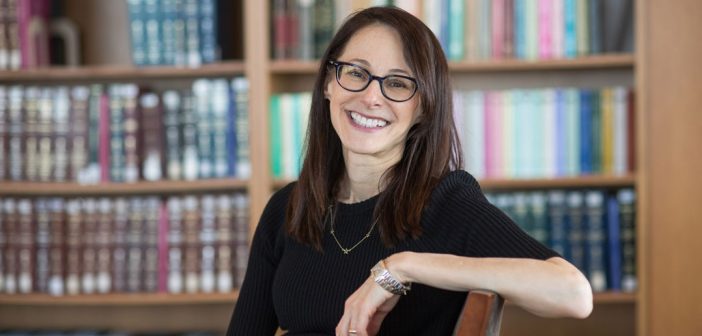Boston University Law Professor and Fordham Law alumna Danielle Citron ’94 has been named a 2019 MacArthur Fellow. This prestigious recognition, also known as the “genius” grant, will come with $625,000 to further her research on privacy rights and hate crimes in cyberspace.
Boston University’s Danielle Citron, whose pioneering and policy-shaping work in countering hate crimes, revenge porn, and other cyberspace abuses has made her one of the nation’s leading privacy and constitutional law scholars, has been named a 2019 MacArthur Fellow.
Citron, a School of Law professor of law, and the other new fellows, whose names were announced Wednesday morning by the John D. and Catherine T. MacArthur Foundation, will each receive a $625,000 no-strings-attached “genius” grant, spread over five years, in recognition of their exceptional creativity, significant achievements, and promise for future advances. For researchers, writers, scientists, entrepreneurs, and all recipients, it is one of the highest honors they can receive.
Citron, who joined LAW in July 2019 and is a member of the Hariri Institute for Computing and Computational Science & Engineering Cyber Security, Law, and Society Alliance, says she was stunned when John Palfrey, MacArthur Foundation president, called her a couple weeks ago with the news. “I screamed,” she says. “I fell on the floor. It’s crazy, right? Ta-Nehisi Coates and Bryan Stevenson are MacArthur Fellows—I can’t believe I’m in the same group.”
…
An advocate and scholar, Citron is vice president of the nonprofit Cyber Civil Rights Initiative, whose mission is to combat online abuses that threaten civil rights and civil liberties, and the author of the widely cited Hate Crimes in Cyberspace (Harvard University Press, 2014), as well as more than 30 major law review articles on privacy, cyber harassment, and how to balance freedom of expression with civil rights and civil liberties on the internet. Citron says she will use at least some of her MacArthur grant to write her second book, on sexual privacy.
…
Today, Citron’s guidance on cyber civil rights and the law is sought after by lawmakers in Washington as well as by Facebook and Twitter (she is an unpaid advisor for both). In June she testified before the House Permanent Select Committee on Intelligence about the threat to democracy—and the 2020 presidential election—of manipulated media, particularly deepfake video and audio. In July she delivered a TED talk on deepfakes at the global TEDSummit in Edinburgh—that video is now approaching a million views.
Additional media coverage on this topic:
MacArthur ‘Genius’ Grant Winners Attest To ‘Power Of Individual Creativity’ (NPR)
Four from Mass. Receive ‘Genius Grants’ from MacArthur Foundation (Boston Globe)
Philosophers, Artists and Geochemists. These Are the 2019 MacArthur ‘Genius Grant’ Winners (TIME)
MacArthur Foundation Announces $625K Genius Grant Recipients (The Washington Post)
2019 MacArthur Foundation ‘Genius Grant’ Winners (U.S. News)
MacArthur ‘Genius’ Grant Winners for 2019: The Full List (The New York Times)




